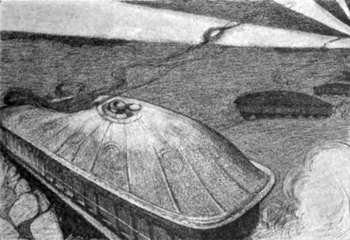and then the artist was running for cover, with the war correspondent behind him. Bang came shrapnel, bursting close at hand as it seemed, and our two men were lying flat in a dip in the ground, and the light and everything had gone again, leaving a vast note of interrogation upon the night.
The war correspondent came within bawling range. "What the deuce was it? Shooting our men down!"
"Black," said the artist, "and like a fort. Not two hundred yards from the first trench."
He sought for comparisons in his mind. "Something between a big blockhouse and a giant's dish-cover," he said.
"And they were running!" said the war correspondent.
"You'd run if a thing like that, searchlight to help it, turned up like a prowling nightmare in the middle of the night."
They crawled to what they judged the edge of the dip and lay regarding the unfathomable dark. For a space they could distinguish nothing, and then a sudden convergence of the searchlights of both sides brought the strange thing out again.
In that flickering pallor it had the effect of a large and clumsy black insect, an insect the size of an ironclad cruiser, crawling obliquely to the first line of trenches and firing shots out of portholes in its side. And on its carcass the bullets must have been battering with more than the passionate violence of hail on a roof of tin.

"It had the effect of a large and clumsy black insect."
Then in the twinkling of an eye the curtain of the dark had fallen again and the monster had vanished, but the crescendo of musketry marked its approach to the trenches.
They were beginning to talk about the thing to each other, when a flying bullet kicked dirt into the artist's face, and they, decided abruptly to crawl down into the cover of the trenches. They had got down with an unobtrusive persistence into the second line, before the dawn had grown clear enough for anything to be seen. They found themselves in a crowd of expectant riflemen, all noisily arguing about what would happen next. The enemy's contrivance had done execution upon the outlying men, it seemed, but they did not believe it would do any more. "Come the day and we'll capture the lot of them," said a burly soldier.
"Them?" said the war correspondent.
"They say there's a regular string of 'em, crawling along the front of our lines. . . . Who cares?"
The darkness filtered away so imperceptibly that at no moment could one declare decisively that one could see. The searchlights ceased to sweep hither and thither. The enemy's monsters were dubious patches of darkness upon the dark, and then
